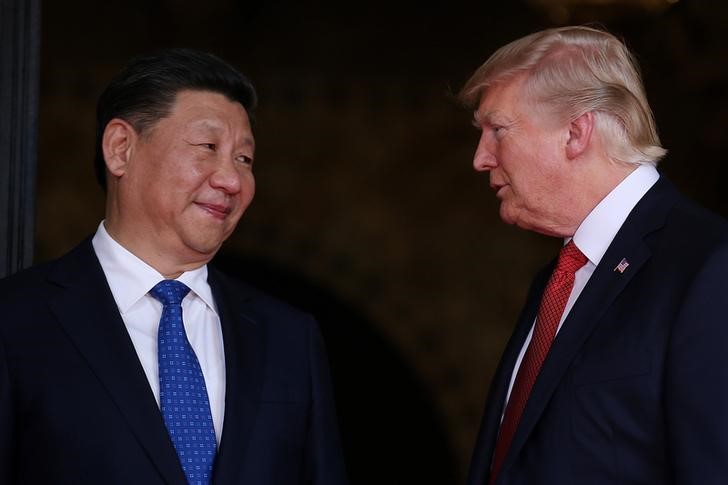Media Report

- The New York Times reports: "China's president, Xi Jinping, has urged President Trump to show restraint toward North Korea despite signs that the North may be preparing a nuclear test. Mr. Xi made the appeal in a phone call with Mr. Trump on Monday that reflected growing alarm over North Korea's plans, which could tip the region into crisis...In the latest call, the third between the two leaders, Mr. Xi indicated to Mr. Trump that China opposed any such test by North Korea, but he also nudged Mr. Trump to avoid a tit-for-tat response to the North's fiery threats, according to a report on Chinese television. 'China adamantly opposes any actions in contravention of the United Nations Security Council resolutions,' Mr. Xi said, according to the report, evidently referring to a series of decisions by the Council to punish North Korea for its nuclear and missile programs. 'At the same time, it is hoped that all sides exercise restraint and avoid doing things that exacerbate tensions on the peninsula,' Mr. Xi said, referring to the Korean Peninsula...the White House said in its brief account of Mr. Trump's call with Mr. Xi. 'The two leaders reaffirmed the urgency of the threat posed by North Korea's missile and nuclear programs, and committed to strengthen coordination in achieving the denuclearization of the Korean Peninsula.' "
- Fortune comments: "The Trump administration last week warned again that if China does not extract North Korea's surrender to U.S. demands that Pyongyang abandon its nuclear and missile activities, the administration will 'solve' the North Korea problem on its own. But attacking Pyongyang's nuclear and missile capabilities would almost certainly trigger Seoul's destruction by North Korean conventional artillery. And targeting North Korea's massive, heavily protected, and well-hidden artillery assets — even with bigger bombs than previously in the U.S. arsenal—will not destroy enough capability to produce an appreciably better strategic outcome. Given these realities, the real challenge before the Trump administration is to treat the North Korean nuclear crisis as an opening to put the security of the world's most economically vital region on a sturdier foundation. Seizing this opportunity requires cultivating more stable relations among major Asian powers...The key to elaborating such relations is serious discussion and diplomacy with China, Japan, and North and South Korea about establishing a reunified Korean state that would be militarily denuclearized and strategically neutral."
- Bloomberg reports: "For farmers like Darrell Stamp, 2013 was a corn crop to forget. A bumper crop created a glut of corn and depressed prices. Making matters worse, China rejected shipments of U.S. corn because of contamination from unapproved genetically modified corn varieties. Prices had crashed 40 percent by the time Stamp sold his crop. 'It was a terrible payout, and we barely broke even,' said Stamp, whose family has been tilling its 3,000-acre spread in Walnut, Iowa, since 1882. 'The market really never came back.'...The trials get underway as China National Chemical Corp. pushes ahead with its $43 billion acquisition of Basel, Switzerland-based Syngenta, designed to transform the state-backed company into the world's biggest supplier of pesticides and agrochemicals. U.S., Chinese and European Union regulators have approved the deal, but the buyout is awaiting a nod from Indian officials. If the deal goes through, it would add a twist to the litigation: a win for the farmers over Syngenta's sales of the seeds would circle back to the Chinese government that rejected the grain."
Calendar
- 2017-04-23 Chinese jihadis' rise in Syria raises concerns at home
- 2017-04-21 Is China too tough a steel beast for Trump to tame?
- 2017-04-20 Philippines checks report of 'harassment' near China-controlled reef
- 2017-04-19 China's Xi restructures military, consolidates control
- 2017-04-18 Ivanka Trump awarded trademark approval in China, dines with Chinese president at Mar-a-Lago
- 2017-04-17 Pence Visits North Korea Border, `Heartened' by China Moves
- 2017-04-14 China Warns of ‘Storm Clouds Gathering’ in U.S.-North Korea Standoff
- 2017-04-13 Trump Says China Won't Be Labeled a Currency Manipulator
- 2017-04-12 Xi and Trump Discuss Rising Tensions With North Korea
- 2017-04-11 Trump Says China Will Get Better Trade Deal if It Solves ‘North Korean Problem’
News
- The New York Times China's Leader Urges Restraint on North Korea in Call With Trump
- Bloomberg Syngenta Defends GMO Corn as Merger Shifts Blame to China's Door
- Reuters China's regulator orders insurers to focus on risk
- Bloomberg China Cools Growth in Wealth Products Worth Trillions of Dollars
- USA Today The next great CEO could be a robot, Alibaba's Jack Ma says
- The Washington Post Trump gets on the phone to Asia as another North Korea flash point looms
- Reuters Eight North Korean defectors in China at risk of deportation: rights group
- USA Today Trump and Xi vow to 'strengthen coordination' to denuclearize Korean Peninsula
- The Financial Times China's fight with Visa and MasterCard goes global
- The Guardian Australia 'committed to' China extradition treaty, but opposition has heard nothing
- The Wall Street Journal 'Apartheid Without the Racism': How China Keeps Rural Folks Down
- CNBC Chinese billionaires amass in the country's heartland
- The Financial Times JPMorgan tops ranking of best-performing asset managers in China
Commentary
- Fortune How Trump Should View North Korea's Nuclear Ambitions
- The Washington Post: Opinions Ivanka Trump's foreign entanglements put America's reputation on the line
- Bloomberg View China's Control Problem
- Quartz Trump's "great chemistry" with Chinese president Xi Jinping is actually not that great
- Forbes Trump's China Advisors Aren't Wrong About The Severity Of The U.S.-China Trade Deficit
- The Hill China's protectionist policies in high-tech industries require U.S. response
- The Diplomat Do US Actions in the South China Sea Violate International Law?
